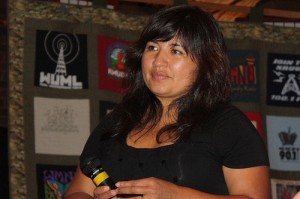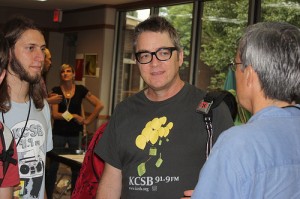 Established by the Grassroots Radio Coalition in 1996 as an alternative to the increasing commercialization of public radio, the Grassroots Radio Conference (GRC), is now one of the most important nonprofit radio events of the year. In contrast to other annual gatherings such as the National Federation of Community Broadcasters (NFCB) Community Radio Conference, in which many attendees adhere to a sponsor-driven, corporate model, the Grassroots Radio Conference is a weekend of discussion that focuses specifically upon the needs of volunteer-based stations.
Established by the Grassroots Radio Coalition in 1996 as an alternative to the increasing commercialization of public radio, the Grassroots Radio Conference (GRC), is now one of the most important nonprofit radio events of the year. In contrast to other annual gatherings such as the National Federation of Community Broadcasters (NFCB) Community Radio Conference, in which many attendees adhere to a sponsor-driven, corporate model, the Grassroots Radio Conference is a weekend of discussion that focuses specifically upon the needs of volunteer-based stations.
The roots-up activism promoted by the GRC is reflected in their organizational structure – or lack thereof. For 15 years the Conference and the Coalition have remained purposefully unincorporated. The organization has as Mission Statement but no officers, no By-Laws. It is run by a Steering Committee that includes, but is not limited to, members of previous and future GRC host stations and representatives from the People of Color Caucus.
The stated purpose of the Grassroots Radio Coalition is to bring attention to importance of “volunteer-based community radio stations” as “cornerstones of participatory democracy, offering ordinary citizens the chance to exercise First Amendment rights in a mass medium and audiences the opportunity to directly support the programming that is of importance to them.” 2011 Conference host station KKFI would be the model member of the GRC. . . if, of course, the GRC had members.
KKFI is a 20 year-old, 100,000-watt community radio station that is run almost entirely by volunteers. Broadcasting on 90.1 FM, KKFI serves the Kansas City metropolitan area with access to locally produced public affairs programs and a range of music shows that are unlike anything else in the region. KKFI is the voice of Kansas City and it does not take this responsibility lightly. Community activism is central to station programming. In recent years, Ann Suellentrop, Tom Klammer, and other KKFI News producers have received national recognition for their use of community radio to resist the establishment of a nuclear arms factory in Kansas City.
The staff of KKFI partnered with the Friends of Community Media (FCM) to become the perfect hosts for Prairie Fire: The 15th Annual Grassroots Radio Conference, which ran from August 18-21, 2011. Top level sponsors included Raymond James Financial – Sharon Lockhart, Free Press, and Austin Airwaves. According to Tom Crane, FCM President and KKFI Founding Member, the purpose of this year’s conference was to “exchange ideas that will help our radio stations become more effective in the twenty-first century.”
When I arrived in Kansas City late Friday afternoon, the final session of the day was about to begin. There were several interesting conversations happening at once. I hovered in the hallway and finally dove into the Meeting Room where Producer Noelle Hanrahan was beginning her discussion of Prison Radio. Hanrahan has been working with Mumia Abu-Jamal for twenty years, recording his commentary over the telephone lines, and distributing it to international radio news programs. She described the difficulties a radio journalist faces when working with American correctional facilities and she suggested creative ways around them. She also discussed the challenges of working with broadcasters to get airplay for controversial material. She stressed the importance of a good technical recording. “Make them censor content not quality” she said, which might have been the most important take-away of the entire event.
Immediately following the discussion was a Banquet Dinner that consisted of local, organic, and vegetarian foods. Over the meal, lively conversation filled me in on all I had missed earlier in the day, which included Keith Rozendal’s presentation on “Grassroots Science & Medical Journalism,” JR Valrey’s “Battling Police Terrorism with the Media,” and Myron Jackson’s workshop on “Creating and Presenting Radio Theater.”
That evening GRC participants hit the streets of Kansas City seeking Bar-B-Q and talking radio with the carnivorous crowd. It was discovered that Jim Ellinger of Austin Airwaves was on his way to Borneo to set up a solar powered radio station and that Otis Maclay is the wizard behind Pacifica Radio‘s Audioport technology.
Saturday morning 9 AM came early. The Grassroots Radio Conference, however, would not wait. While presenting my own discussion of the College Radio Crisis with a spotlight on my alma mater WRVU, Ellinger was in the Bragg Auditorium presenting his preview of “The Next 100 Community Radio Stations”; Maclay was hosting a Question & Answer session on “Internet Technology: Copyright Reporting,” and Maggie Avener of Prometheus Radio Project gave “The DC Report” a session discussing new legislation and its impact on community broadcasters.
With competition like that, it is a wonder anyone attended my session at all! The loss of KTRU, KUSF, WRVU, and BSR, however, makes the College Radio Crisis a hot topic these days and participants were anxious to learn how they could protect their own educational frequencies.
Ted Coe and Eric Wolff from KCSB 91.9 FM at the University of California in Santa Barbara announced the 50th Anniversary of their student-run radio station. The yearlong celebration of student broadcasting at KCSB includes a logo design contest with a $500 reward; “Wireless,” a radio-oriented art-exhibition at the Santa Barbara Contemporary Arts Forum (SB-CAF); and a radio-themed film festival. It is this sort of fun and proactive approach to station viability that college radio stations across the country should consider implementing in these dangerous times. Other Saturday sessions at the GRC included “The Feminist Programming Roundtable” facilitated by Frieda Werden of WINGS and “Copyright Concerns for Grassroots Radio” a discussion led by Dr. Andrew Ó Baoill, Professor of Communication Studies at Cazenovia College.
Brice Phillips of WQRZ-LP led a somber discussion of his experience as a community broadcaster providing emergency assistance during the Hurricane Katrina disaster. This was followed by workshops on predicting weather and preparing for local emergencies. Other seminars focused on day-to-day station operations, volunteer management and programming for FM.
Podcast 411 President Rob Welch hosted “Podcasting 101” a workshop that provided a step-by-step tutorial for turning a radio program into a successful podcast. David Pakman‘s “No-Holds Barred Guide to Using the Internet to Promote Indie Media” was a fun presentation in which he introduced useful marketing techniques such as shareyouraccount.com and affiliate shopping programs with Amazon.
Other events of the day included the Pacifica Network lunch meeting in which Affiliates Coordinator Ursula Ruedenberg recognized Betsy McDougall for her work constructing KKWE, Niijii Radio, a public broadcasting initiative on the White Earth Reservation. Ruedenberg, it turns out, has her own exciting news. She and her colleagues at KHOI have received a permit to construct 89.9 FM as a new community radio station for central Iowa.
These inspirational stories led me into a hopeful session entitled “Get Your LPFM Permit and UU Grant” where Mary Francis, President of KVOY 89.7 FM Oklahoma discussed the recent passage of the Local Community Radio Act. The FCC will make hundreds, potentially thousands, of Low Power FM frequencies available as early as next year. Mary Francis provided practical instruction for community groups who are interested in acquiring them. This was the perfect introduction to Sunday’s post-conference workshop “How to Start Your Own LPFM” presented by Vanessa Graber and Maggie Avener of Prometheus.
The meetings, lectures, and discussions at this year’s Grassroots Radio Conference were engaging, informative, and well attended. The session offerings were rivaled only by the discussion taking place in the hallways and in the outdoor garden where the likes of Simon Frech, Donna DiBianco, and Tom Vorhees traded legal advice for technological tips. While the workshops provided first class instruction and lively discussion, it is backstage and behind the scenes of the GRC that the real work in community radio was being done.
Saturday evening’s GRC field trip included a dinner at the legendary Author Bryant’s down on 19th and Vine. The Kansas City Bar-B-Q was followed by desserts and the music of Gerald Trimble at the Writer’s Place. The late-night party continued at the home of Tom Crane. Sporadically throughout the evening, groups of individuals snuck off to the new KKFI studios. There, they were invited to make appearances on “Driftless Dark” with Todd Fisher Wallin of WDRT as he demonstrated Open Source technologies with a live hometown audience in Viroqua, Wisconsin from the studios of KKFI.
On Sunday, a breakfast roundtable included a historical breakdown of the GRC from Norman Stockwell, Operations Coordinator at WORT 89.9 FM Madison. This was followed by open-mic discussion of strategies for future conferences. Chief among the concerns were communication and outreach. The effectiveness and longevity of the GRC depends upon its ability to connect America’s community radio stations. While stations as far away as KMUD, Redwood Community Radio, in California sent representatives to the Conference, volunteer stations as nearby as KDHX in St. Louis did not. In the dangerous waters of FM radio where every frequency is considered “Beachfront Property” (as stated by Public Radio Capital’s Susan Harmon during the “How to Save College Radio” panel at SXSW), community stations should seize the opportunity offered by the Grassroots Radio
Conference to share strategies and make allegiances.
The GRC has a strong foundation and is certain to grow with the gold rush of LPFM licenses that will become available in the next few years. The Grassroots Radio Conference will provide these infant stations with the perfect opportunity to connect with the veterans of community broadcasting and learn their tricks of survival. WEFT 90.1 in Champaign-Urbana, Illinois is set to host the 2012 Grassroots Radio Conference. Community stations that have never attended the GRC should plan to attend next summer. The stations that were present at Prairie Fire 2011 in Kansas City have already made it a priority.
A former college radio DJ at WRVU (Vanderbilt University), Sharon Scott is the author of Toys and American Culture: An Encyclopedia and the President of WRVU Friends & Family, a non-profit organization designed to support FM broadcasting opportunities for the students of Vanderbilt University. WRVU Friends & Family continues to fight the proposed sale of 91.1 FM from Vanderbilt Student Communications (VSC) to Nashville Public Radio (WPLN).




